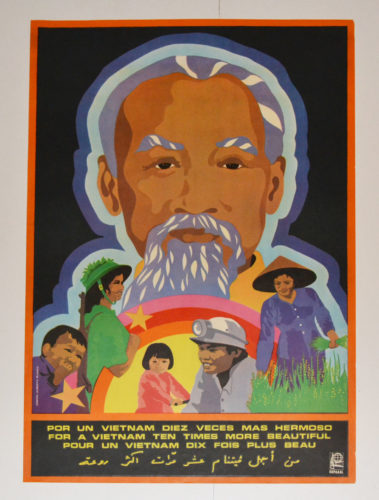SPIRIT OF ’68 TIMELINE
WEEK 3 PLAYLIST (audio)
or as VIDEO PLAYLIST
WEEK 3 BIG IDEAS:
Shifts in the ideological terrain fueled the revolutionary spirit of the time.
- Third World consciousness we see a change in who is understood in being the protagonists as agents of change
- Third World anti-imperialism, esp. to US imperialism (opposition against a shared enemy)
- worldwide student protests—what’s being taught, who’s teaching, who’s admitted
The spirit of 1968 was fortified not only by physical struggle, but through the ideological battle of ideas and some of the ideological influences of the period.
- Centrality of Marxist-Leninist thought (e.g. Fanon, Mao, Che)
- If you believe the 3rd World is the protagonist of revolution, how you support or participate in it is going to play out strategically?
- Tricontinental or Black Panther Party newspaper, speeches, pamphlets, film
- How is space being opened up for women? For queer people? For other groups that had previously been left out of the conversation? What barriers remained to those groups breaking through?
- Counterrevolutionary forces—how to trying to suppress and repress more radical ideas
- Neoliberalism as a political project—animates how people make economic decisions
It’s important to pay attention not only to the relationship of ideas and actions during the period, but also the tools and vehicles used to circulate those ideas.
- What kinds of assumptions do people on the left make get shaped by the period? What is our common sense (either proactively or because of the backlash)
Questions to Consider in Relationship to this Week’s Assigned Materials:
- Continuing on the theme of the crisis of hegemony in the ’68 period, what are some of the ways that the materials for this week illustrate shifts in or breaks from what had been dominant beliefs and ideas? How do ideas battle each other?
- What are the economic and political conditions from which these ideologies are emerging?
- We have discussed this period as one of worldwide revolution. What are some of the beliefs and ideas that bind people together in this period that help generate a sense of global consciousness that fuel shared struggles across the globe?
- What are different ways that organizations/parties mobilize ideology?
- What role(s) do vehicles from platforms to newspapers and newsletters, to film, printmaking, and music play in forwarding the revolutionary ideologies of the period? What are some of the ways that they draw connections between the liberation struggles of the time?
ASSIGNED MATERIALS
The OSPAAAL poster index (website)
Bobby Seale talking about the Black Panther Party 10 Point Program (video)
“Decolonizing American: Fanonism Reconsidered” (pp. 65-74) from Nikhil Pal Singh’s essay, “The Black Panthers and the ‘Undeveloped Country of the Left” in the book, The Black Panther Party Reconsidered (text)
Excerpt from Natalie Havlin’s “‘To Live a Humanity under the Skin’: Revolutionary Love and Third World Praxis in 1970s Chicana Feminism” (pp.78-88) from Women’s Studies Quarterly, Vol. 43:3-4. (text)
Lena Meari’s “Reading Che in Colonized Palestine” from NACLA Report on the Americas (text)
Chapter 7 from Nancy Maclean’s Democracy in Chains: The Deep History of the Radical Right’s Stealth Plan for America OR Listen to a segment of an interview with Nancy Maclean from The Dig podcast: https://www.blubrry.com/jacobin/34546244/the-dig-democracy-in-chains-with-nancy-maclean/ (min. 36:10-43:25)
SUPPLEMENTAL MATERIALS
Turning Point (video)
Bill Mullen, “By the Book: Quotations from Chairman Mao and the making of Afro-Asian radicalism, 1966-1975.” from Mao’s Little Red Book: A Global History edited by Alexander C. Cook (text)
Amilcar Cabral, “The Weapon of Theory” (text)
In Various Constructs: Remembering Cecil Taylor by Eric Porter from Viewpoint Magazine, July 26, 2018.
A Few other Platforms to compare to the BPP platform:
- I Wor Kuen platform (1969): http://www.historyisaweapon.com/defcon1/12pointiworkuen.html
- Popular Front for the Liberation of Palestine (1969) platform: http://pflp.ps/english/1969/12/21/platform-of-the-popular-front-for-the-liberation-of-palestine-1969/
- AIM: http://www.aimovement.org/archives/index.html
- CPP (1968): http://library.redspark.nu/1968_-_Constitution_of_the_Communist_Party_of_the_Philippines
- Revolutionary People’s Constitutional Convention (1970)
Week 3 Playlist:
FOLLOW-UP MATERIALS
Dignidad Rebelde (website)
Freedom Road Socialist Organization (website)
“Strike Over but Struggle Goes On” from The Movement (p.14), and interview with Third World Liberation Front members (text)
Mao Tse-Tung “Statement Mao Tse-Tung in Support of the Afro-American Struggle against Violent Repression” (text)
Frantz Fanon, “National Independence: The Only Possible Outcome” (text)
Robin DG Kelley and Betsy Esch “Black Like Mao: Red China and Black Revolution” in Afro Asia: Revolutionary Political and Cultural Connections between African Americans and Asian Americans edited by Bill V. Mullen and Fred Ho (text)
Black Power Mixtape (video)
George Wallace stand-off at University of Alabama (video)
Poems by Alprentice “Bunchy” Carter: “Black Mother” and “Green Dolphin Street” (text)
Work by Malaquias Montoya (website)
Interview with Aimé Césaire (text)
“The ‘soviet way of life’ as a way of feeling: Emotion and Influence on Soviet Central Television in the Brezhnev Era” by Christine Evans from Cahiers du monde russe 2015/2 Vol. 56. (text)
“Power, Policy, and Ideology in the Making of China’s ‘Cultural Revolution’” prepared by the Rand Corporation for the US Air Force (text)
Communist Party of South Africa’s Path to Power document (text)
Strategy and Tactics of the ANC (text)
General history of South Africa timeline.
Louis Althusser’s Ideology and Ideological State Apparatuses (text)
Keywords
Ideology is a set of beliefs or ideas, both conscious and unconscious, that guides or motivates an individual, group or society’s relationships, political and economic systems, and/or actions.

